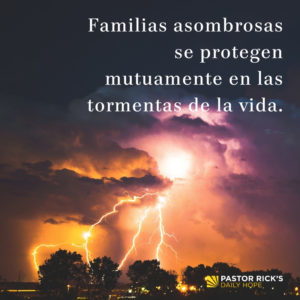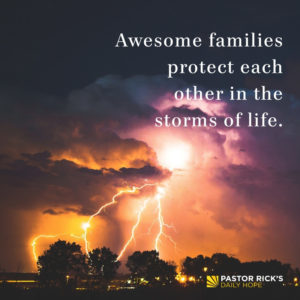Rick Warren's Blog, page 448
May 11, 2019
Leave a Legacy of Hospitality

Awesome families teach their kids that they’re not the center of the universe. They teach their kids that God made them and shaped them for a mission. They model dedication, service, generosity, and prayer. Average families don’t do those things. Awesome families do.
I am the man that I am today first of all because of my parents. They instilled in me certain values to care about other people.
My parents were very, very poor, but they both had the gift of hospitality. They loved to give to others even though they didn’t have much. We lived out in the country, and my dad would plant an acre garden with all kinds of vegetables. There was no way our family could eat all that food, but he did it just so he could give it away, because he didn’t have any money to give away. So we always planted more and then gave it away to help other people who were in need.
Our home was constantly filled with other people. If people were in pain, they were at our house. If they were on the road, they were at our house. If they were going through a conflict, they were at our house. If they were a well-known Christian leader coming through town, they were at our house. One day my dad added up how many meals my mom had cooked for guests in our home in one year. It was over a thousand meals! I grew up learning an attitude of “give your life away” and that it’s not about me. It’s about helping other people.
That’s what awesome families do. They teach each other to show love and to do good deeds. Good deeds are called ministry. They are called service.
A good example of this is Cornelius’ family in the book of Acts: “He and all his family were devout and God-fearing; he gave generously to those in need and prayed to God regularly” (Acts 10:2 NIV).
What a great legacy! Wouldn’t you like to have people writing that about you and your family one day?
Whether you have children or not, God wants you to leave a legacy like that. You’ll find people younger in age—or younger in the faith—all around you. Will you take the time to help others become what God has made them to be? Would you help them discover God’s mission for their life?
The post Leave a Legacy of Hospitality appeared first on Pastor Rick's Daily Hope.
Deja un Legado de Hospitalidad

“Pensemos en maneras de motivarnos unos a otros a realizar actos de amor y buenas acciones” (Hebreos 10:24 NTV).
Las familias ejemplares enseñan a sus hijos que ellos no son el centro del universo. Ellos les enseñan a sus hijos que Dios lo hizo y los formó para una misión. Ellos modelan la dedicación, servicio, generosidad y la oración. Las familias promedio no hacen esas cosas. Las familias ejemplares sí.
Soy el hombre que soy hoy primero que todo por mis padres. Ellos inculcaron en mí ciertos valores y preocuparme por otras personas.
Mis padres eran muy, muy pobres, pero ellos tenían el don de la hospitalidad. Ellos amaban dar a otros incluso cuando no tenían mucho. Vivimos fuera de la ciudad, y mi papá plantó un acre de toda clase de vegetales. No había forma en la que nuestra familia se comiera toda esa comida, pero solo lo hizo para poder regalarla, porque él no tenía dinero para dar. Así que siempre plantaba más y lo regalaba para ayudar a otras personas que estaban en necesidad.
Nuestra casa estaba constantemente llena con otras personas. Si las personas sufrían, estaban en nuestra casa. Si estaban en el camino, iban a nuestra casa. Si tenían un conflicto, ellos iban a nuestra casa. Un día mi papá contó las comidas que mi mamá había preparado para invitados en nuestra casa en un año. ¡Fueron más de mil! Crecí aprendiendo una actitud de “dar tu vida” y no se trata de mí. Se trata de ayudar a otras personas.
Eso es lo que hacen las familias ejemplares. Se enseñan mutuamente a mostrar amor y a hacer buenas obras. A las buenas obras se les llama ministerio. Se les llama servicio.
Un ejemplo excelente de esto es la familia de Cornelius en el libro de Hechos: “Él y toda su familia eran devotos y temerosos de Dios. Realizaba muchas obras de beneficencia para el pueblo de Israel y oraba a Dios constantemente” (Hechos 10:2 NVI)
¡Qué gran legado! ¿No te gustaría que las personas escribieran sobre ti y tu familia algún día?
Ya sea que tengas hijos o no, Dios quiere que dejes un legado como ese. Encontrarás personas más jóvenes de edad –o en la fe- a tu alrededor. ¿Te tomarás el tiempo de ayudar a otros a ser lo que Dios los ha hecho? ¿Ayudarás a otros a descubrir la misión de Dios para sus vidas?
Reflexiona sobre esto :
¿Qué tipo de legado quieres dejar? ¿Cómo estás trabajando para dejar ese tipo de legado?
Si no tienes hijos, ¿Quiénes son los jóvenes en tu vida a quienes puedes animar a buscar su propósito y ayudar a otros?
¿Qué evita que abras tu casa a otros?
The post Deja un Legado de Hospitalidad appeared first on Pastor Rick's Daily Hope.
May 10, 2019
Las Relaciones son tu Impermeable en la Tormenta

“Más valen dos que uno . . . si uno de ellos se tropieza, el otro puede levantarlo. Pero ¡pobre del que cae y no tiene quien lo ayude a levantarse!” (Eclesiastés 4:9 TLA).
Las relaciones son un impermeable durante las tormentas de la vida. No importa cuál de nuestros amigos o familiares esté pasando por una tormenta, tenemos que ayudarnos unos a otros. Las personas comprometidas entre sí se protegen en la tormenta.
Eclesiastés 4:9 dice, “Más valen dos que uno . . . si uno de ellos se tropieza, el otro puede levantarlo. Pero ¡pobre del que cae y no tiene quien lo ayude a levantarse” (TLA).
Hay tres tormentas que debemos cuidar de quienes nos cuidan. La primera es el cambio. Otra tormenta de vida es lo que llamo ideas dañinas.
Pero la tormenta más dolorosa de todas es el rechazo. Cuando tu amigo, tus hijos, o tu esposo o tu esposa se sienten rechazados, tu, y otras personas cercanas a ellos, necesitan unirse a ellos y estar allí como un impermeable en la tormenta.
Nunca olvidaré hace muchos años cuando mi hija mayor, Amy, estaba en la escuela secundaria. Ella trató de ser una porrista. Ella fue a practicar después de la práctica. Sus amigos fueron aceptados, pero ella fue rechazada, y eso le rompió el corazón. Cuando llegó a casa, corrió a su habitación, entró en su armario, se sentó en el suelo y puso a llorar.
Cada uno de nosotros en nuestra familia podía escuchar a Amy llorando. Y uno por uno, todos por su cuenta, terminamos entrando a su habitación, sentados en el suelo en su armario y lloramos con ella.
No le dimos ningún consejo. ¡No necesitaba un consejo! No dijimos: “Ahora, ahora, no te preocupes. No es un gran problema “. ¡Fue un gran problema! No dijimos: “¡No llores!” Eso es algo estúpido decirle a alguien que está de duelo. No. Todos nos sentamos allí y durante unos 30 minutos lloramos con ella.
Nuestra familia nunca olvidará ese incidente. ¿Por qué? Porque en ese momento, estábamos siendo un impermeable para ella. Estábamos siendo un cazador de tormentas. Estábamos siendo un protector. Alguien en nuestra familia había sido herido, y no lo degradábamos. No estábamos tratando de disuadirla de eso. No estábamos tratando de animarla. Solo lloramos con ella.
Familias asombrosas, biológicas, adoptivas y espirituales, se protegen mutuamente en la tormenta.
Reflexiona sobre esto :
¿Por qué las personas deberían sentir el mayor apoyo de sus familias?
¿Qué suele decirle a un niño que se ha enfrentado al rechazo? ¿Qué crees que es lo amoroso y bíblico que se puede decir o hacer?
¿Cómo a veces tratamos de convencer a las personas por sentirse rechazadas? ¿Cuál es el daño en hacer esto?
The post Las Relaciones son tu Impermeable en la Tormenta appeared first on Pastor Rick's Daily Hope.
Relationships Are Your Raincoat in the Storm

Relationships are a raincoat during the storms of life. No matter which of our friends or family members are going through a storm, we have to help each other. People committed to one another protect each other in the storm.
Ecclesiastes 4:9 says, “Two are better off than one . . . If one of them falls down, the other can help him up. But if someone is alone and falls, it’s just too bad, because there is no one to help him” (GNT).
There are three storms that we need to care for those we care about. The first is change. Another storm of life is what I call harmful ideas.
But the most painful storm of all is rejection. When your friend, your children, or your husband or your wife feels rejected, you—and others close to them—need to rally around them and be there as a raincoat in the storm.
I’ll never forget many years ago when my oldest child, Amy, was in high school. She tried out to be a cheerleader. She went to practice after practice. Her friends got accepted, but she was rejected, and it broke her heart. When she came home, she ran into her room, went into her closet, sat down on the floor, and burst into tears.
Every one of us in our family could hear Amy crying. And one by one, all on our own, we ended up walking into her room, sitting down on the floor in her closet with her, and crying with her.
We didn’t give her any advice. She didn’t need advice! We didn’t say, “Now now, don’t worry. It’s not a big deal.” It was a big deal! We didn’t say, “Don’t cry!” That’s a stupid thing to say to somebody who’s grieving. No. We all just sat there and for about 30 minutes just cried with her.
Our family will never forget that incident. Why? Because at that point, we were being a raincoat for her. We were being a storm catcher. We were being a protector. Somebody in our family had been hurt, and we weren’t demeaning it. We weren’t trying to talk her out of it. We weren’t trying to cheer her up. We just wept with her.
Awesome families—biological, adoptive, and spiritual—protect each other in the storm.
The post Relationships Are Your Raincoat in the Storm appeared first on Pastor Rick's Daily Hope.
May 9, 2019
Cómo los Miembros de la Familia se Ayudan Mutuamente a Crecer

“Y, dado que yo, su Señor y Maestro, les he lavado los pies, ustedes deben lavarse los pies unos a otros. Les di mi ejemplo para que lo sigan. Hagan lo mismo que yo he hecho con ustedes” (Juan 13:14-15 NTV).
Si una de las marcas de una familia increíble, ya sea tu familia biológica, tu familia adoptiva o tu familia de la iglesia, es que se ayuden a crecer mutuamente, ¿cómo lo hacen?
Déjame darte dos métodos que ayudan a las personas a crecer y dos que no. Esto se aplica en todos los ámbitos de la vida.
Se ayudan mutuamente a crecer:
A través del ejemplo. Jesús hizo esto al enseñar a sus discípulos. Juan 13:14-15 dice: “Y, dado que yo… les he lavado los pies, ustedes deben lavarse los pies unos a otros. Les di mi ejemplo para que lo sigan. Hagan lo mismo que yo he hecho con ustedes” (NTV). Tus hijos no quieren escuchar un sermón. Quieren ver el ejemplo de Jesús en tu vida.
A través de conversaciones. Si no estás teniendo conversaciones críticas con tus hijos sobre problemas reales, no están creciendo. Desafortunadamente, la mayoría de las conversaciones que tenemos con los chicos son sobre horarios, comidas o tareas y no sobre las cosas que realmente importan en la vida.
La Biblia dice en Deuteronomio 6:7 “Repíteselos a tus hijos una y otra vez. Habla de ellos en tus conversaciones cuando estés en tu casa y cuando vayas por el camino, cuando te acuestes y cuando te levantes.” (NTV).
Ahora déjame decirte dos formas que no funcionan para ayudar a las personas a crecer:
A través de la crítica. El regaño no funciona. La condena no funciona. Criticar y quejarse es totalmente ineficaz para ayudar a una persona a cambiar. ¿Por qué? Porque cuando críticas, te estás enfocando en lo que no quieres en lugar de lo que quieres.
Efesios 6:4 dice: “Y ustedes, padres, no hagan enojar a sus hijos, sino críenlos según la disciplina e instrucción del Señor”. (NVI)
A través de la comparación. Cada persona es única. ¡No hay nadie en el mundo como tú! Es por eso por lo que comparar nunca, nunca funciona. De hecho, es letal para cualquier relación. La Biblia dice: “Cada cual examine su propia conducta; y, si tiene algo de qué presumir, que no se compare con nadie.” (Gálatas 6:4 NVI).
La Biblia dice 58 veces: “Ámense unos a otros. Cuídense el uno del otro. Oren el uno por el otro. Anímense unos a otros. Ayúdense unos a otros. Se aconsejan unos a otros. Apóyense unos a otros” y así sucesivamente. Así es como Dios quiso que fuera. En el Nuevo Testamento, se nos dice que “Por eso, anímense y edifíquense unos a otros, tal como lo vienen haciendo” (1 Tesalonicenses 5:11 NVI).
Reflexiona sobre esto:
Piensa en las conversaciones que tuviste con tu familia ayer o hoy. ¿Estabas hablando de cosas que realmente importan en la vida?
¿Qué fue lo último que corregiste a tus hijos? ¿Cómo estás siendo un ejemplo diario de la forma correcta de vivir en lugar de ese comportamiento incorrecto?
En lugar de comparar o criticar, ¿cómo puede usted formar a las personas de su familia?
The post Cómo los Miembros de la Familia se Ayudan Mutuamente a Crecer appeared first on Pastor Rick's Daily Hope.
How Family Members Help Each Other Grow

If one of the marks of an awesome family—whether it’s your biological family, your adoptive family or your church family—is that you help each other grow, then how do you do that?
Let me give you two methods that help people grow and two that don’t. This applies in every area of life.
You help each other grow:
Through example. Jesus did this in teaching his disciples. John 13:14-15 says, “Since I . . . have washed your feet, you ought to wash each other’s feet. I have given you an example to follow. Do as I have done to you” (NLT). Your kids don’t want to hear a sermon. They want to see Jesus’ example in your life.
Through conversations. If you’re not having critical conversations with your kids about real issues, they’re not growing. Unfortunately most conversations we have with kids are about schedules, eating, or homework and not about the stuff that really matters in life.
The Bible says in Deuteronomy 6:7, “You must teach [God’s commandments] to your children and talk about them when you are at home or out for a walk; at bedtime and the first thing in the morning” (TLB).
Now let me tell you two ways that don’t work to help people grow:
Through criticism. Nagging doesn’t work. Condemning doesn’t work. Criticizing and complaining are totally ineffective in helping a person change. Why? Because when you criticize, you’re focusing on what you don’t want rather than what you do want.
Ephesians 6:4 says, “Don’t keep on scolding and nagging your children, making them angry and resentful. Rather, bring them up with the loving discipline the Lord himself approves, with suggestions and godly advice.”
Through comparing. Everybody’s unique. There’s nobody in the world like you! That’s why comparing never, ever works. In fact it’s lethal to any relationship. The Bible says, “Each person should judge his own actions and not compare himself with others. Then he can be proud for what he himself has done” (Galatians 6:4 NCV).
The Bible says 58 times, “Love one another. Care for one another. Pray for one another. Encourage one another. Help one another. Counsel one another. Support one another” and on and on. That’s the way God meant for it to be. In the New Testament, we’re told to “encourage one another and build each other up, just as in fact [we] are doing” (1 Thessalonians 5:11 NIV).
The post How Family Members Help Each Other Grow appeared first on Pastor Rick's Daily Hope.
May 8, 2019
El Amor de Dios te Libera para Amar sin Miedo

“En esa clase de amor no hay temor, porque el amor perfecto expulsa todo temor. Si tenemos miedo es por temor al castigo, y esto muestra que no hemos experimentado plenamente el perfecto amor de Dios” (1 Juan 4:18 NTV).
Cuando las personas experimentan conflictos en las relaciones, a menudo es una señal de que alguien está tratando de controlar a la otra persona. ¿Qué hay detrás de ese control? Es miedo La inseguridad nos hace tratar de controlar a otros o resistir el control de otros. Cuando estás tan inseguro que todo lo que piensas es lo que otros piensan de ti, destruye tus relaciones y desactiva tu vida.
Es un dilema asombroso que tenemos como seres humanos: anhelamos estar cerca, pero también tememos estar cerca. Anhelamos tener intimidad con los demás, pero también nos morimos de miedo.
La inseguridad previene la intimidad y destruye tus relaciones. No puedes acercarte a alguien si hay temor en la relación. Si la inseguridad destruye las relaciones, ¿qué las construye? ¡El amor! El amor construye relaciones.
La Biblia dice en 1 Juan 4:18, “En esa clase de amor no hay temor, porque el amor perfecto expulsa todo temor. Si tenemos miedo es por temor al castigo, y esto muestra que no hemos experimentado plenamente el perfecto amor de Dios” (NTV). ¿Cómo funciona? ¿Cómo el amor expulsa todo temor?
El amor quita la atención de ti y se enfoca en los demás. La gente me pregunta muchas veces: “¿Alguna vez te pones nervioso cuando hablas con mucha gente en Saddleback?” La respuesta es: “¡Por supuesto!” ¿Pero sabes qué es lo que marca la diferencia? Me quito la atención de mí y me concentro en las personas frente a mí. Si estuviera allí pensando en lo que pensaban de mi peinado, tendría algo que temer, ¿no? Pero en el momento en que empiezo a pensar cuánto amo a mi familia de la iglesia y cómo servimos a Dios, de repente, el miedo se ha ido.
Es lo mismo en cualquier relación. Enfocarse en la otra persona te da el poder de expulsar el temor de tu vida.
Entonces, ¿cómo encuentras ese poder para enfocarte en otras personas? Te das cuenta de cuánto te ama Dios. En el momento en que empiezas a comprender cuánto te ama Dios, ya no tienes que probarte a ti mismo nunca más. No tienes que pasar tu vida tratando de impresionar a otras personas, porque ya sabes que Dios te ama.
¿Sabes lo liberador y divertido que es vivir la vida de esa manera? Tu identidad y tu autoestima no están atrapados en lo que otros puedan pensar de ti. Cuando estás seguro en tu relación con Cristo, ya no estás presionado por las expectativas de los demás. El amor de Dios te libera para amar a otros sin temor.
Reflexiona sobre esto:
¿Qué inseguridades o miedos te impiden abrirle la vida y el corazón a alguien, ya sea un amigo, cónyuge o familiar?
¿Cómo nuestra cultura nos mantiene inseguros en nuestras relaciones?
¿Qué crees que Dios cree de ti? ¿Qué ve él cuando te mira?
The post El Amor de Dios te Libera para Amar sin Miedo appeared first on Pastor Rick's Daily Hope.
God’s Love Frees You to Love Fearlessly

When people experience conflict in relationships, it’s often a sign that somebody’s trying to control somebody else. What’s beneath that control? It’s fear. Insecurity causes us to try to control others or resist the control of others. When you’re so insecure that all you think about is what others think of you, it destroys your relationships and disables your life.
It’s an amazing dilemma we have as human beings: We long to be close, but we also fear being close. We long to have intimacy with others, but we’re also scared to death of it.
Insecurity prevents intimacy and destroys your relationships. You can’t get close to somebody if there’s fear in the relationship. If insecurity destroys relationships, then what builds them? Love! Love builds relationships.
The Bible says in 1 John 4:18, “Love has no fear, because perfect love expels all fear. If we are afraid, it . . . shows that we have not fully experienced his perfect love” (NLT). How does that work? How does love expel all fear?
Love takes the focus off of you and puts the focus on others. People ask me a lot of times, “Do you ever get nervous when you’re talking to a lot of people at Saddleback?” The answer is, “Of course!” But you know what makes the difference? I get the focus off of me and focus on the people in front of me instead. If I stood there thinking about what they thought of my hairstyle, I would have something to be afraid of, right? But the minute I start thinking about how much I love my church family and how we serve God together, all of a sudden, the fear is gone.
It’s the same in any relationship. Focusing on the other person gives you the power to throw fear out of your life.
So how do you find that power to focus on other people? You realize how much God loves you. The moment you begin to understand how much God loves you, you don’t have to prove yourself any more. You don’t have to spend your life trying to impress other people, because you already know that God loves you.
Do you know how freeing and enjoyable it is to live life that way? Your identity and self-worth are not caught up in what others might think of you. When you’re secure in your relationship with Christ, you’re no longer pressured by everybody else’s expectations. God’s love frees you to love others fearlessly.
The post God’s Love Frees You to Love Fearlessly appeared first on Pastor Rick's Daily Hope.
May 7, 2019
How to Live in Light of Eternity

The vast majority of people pay no attention to eternity. They’re living for the here and now, which is a waste, because everything that’s “here and now” isn’t going to matter in five minutes, much less 50 years—and certainly not for eternity. If we stretched a rope from California to Tokyo, and that represented all of eternity, your life on Earth would be represented by less than one millimeter.
So how do you live in light of eternity? You live for God’s glory, because he’s going to share his glory with you in heaven.
The Bible says in 2 Peter 1:3, “For as you know him better, he will give you, through his great power, everything you need for living a truly good life: he even shares his own glory and his own goodness with us!” (TLB).
You don’t get to choose what’s going to happen to you the rest of your life. But you do get to choose how you respond. You can face the future as a cynic, as a critic, as a pessimist, or as a doubter. You can face the future expecting the worst and experiencing the worst. You can face your future being ungracious to other people, and you can live for the glory of yourself.
Or you can face the future with gratitude, generosity, and graciousness and live for the glory of God. Which one do you think will make you happier? Which one do you think will make you more successful? Which one do you think will bring a smile to God and the reward of heaven?
Matthew 5:16 says, “Let your light shine before others, so that they may see your good works and give glory to your Father who is in heaven” (ESV).
We were created because God wants a family. He wants to spend eternity with his family. He wants to spend eternity with you and me! Heaven is one of the most important reasons Christians can be joyful—God has given us eternal life, and heaven will be amazing!
The post How to Live in Light of Eternity appeared first on Pastor Rick's Daily Hope.
Cómo Vivir en la Luz de la Eternidad

“Mediante su divino poder, Dios nos ha dado todo lo que necesitamos para llevar una vida de rectitud. Todo esto lo recibimos al llegar a conocer a aquel que nos llamó por medio de su maravillosa gloria y excelencia” (2 Pedro 1:3 TLB).
La gran mayoría de las personas no prestan atención a la eternidad. Ellos están viviendo por el aquí y el ahora, lo cual es un desperdicio, porque todo lo que existe “aquí y ahora” no van a importar en cinco minutos, mucho menos en cincuenta años –y seguramente tampoco en la eternidad. Si ponemos una cuerda entre California y Tokio, y eso representara toda la eternidad, tu vida en la tierra sería representada por menos de un milímetro.
Así que, ¿Cómo vives en la luz de la eternidad? Viviendo para la gloria de Dios, porque él va a compartir Su gloria contigo en el cielo.
La Biblia dice en 2 Pedro 1:3, “Mediante su divino poder, Dios nos ha dado todo lo que necesitamos para llevar una vida de rectitud. Todo esto lo recibimos al llegar a conocer a aquel que nos llamó por medio de su maravillosa gloria y excelencia” (NTV).
No puedes elegir lo que te sucederá por el resto de tu vida. Pero puedes elegir como responder. Puedes enfrentar el futuro tanto como un cínico, como un crítico, o como pesimista, o dudoso. Puedes enfrentar el futuro esperando lo peor y experimentando lo peor. Puedes enfrentar tu futuro siendo desagradable con otras personas y puedes vivir para ti mismo.
O puedes enfrentar el futuro con gratitud, generosidad y bondad y vivir para la gloria de Dios. ¿Cuál crees que te hará más feliz? ¿Cuál crees que te hará más exitoso? ¿Cuál crees que hará sonreír a Dios y te traerá la recompensa del cielo?
Mateo 5:16 dice, “De la misma manera, dejen que sus buenas acciones brillen a la vista de todos, para que todos alaben a su Padre celestial” (NTV).
Fuimos creados porque Dios quiere una familia. Él quiere pasar la eternidad con su familia. ¡Él quiere pasar la eternidad contigo y conmigo! El cielo es una de las razones más importantes para que los cristianos puedan estar felices –¡Dios nos ha dado la vida eterna, y el cielo será sorprendente!
Reflexiona sobre esto:
¿De qué maneras Dios usa tu tiempo en la tierra para prepararte para la eternidad?
¿Cómo te hace más feliz el ser agradecido y generoso?
Cuando esperas lo peor en la vida, ¿Qué dice eso sobre lo que crees de Dios?
The post Cómo Vivir en la Luz de la Eternidad appeared first on Pastor Rick's Daily Hope.
Rick Warren's Blog
- Rick Warren's profile
- 2008 followers



